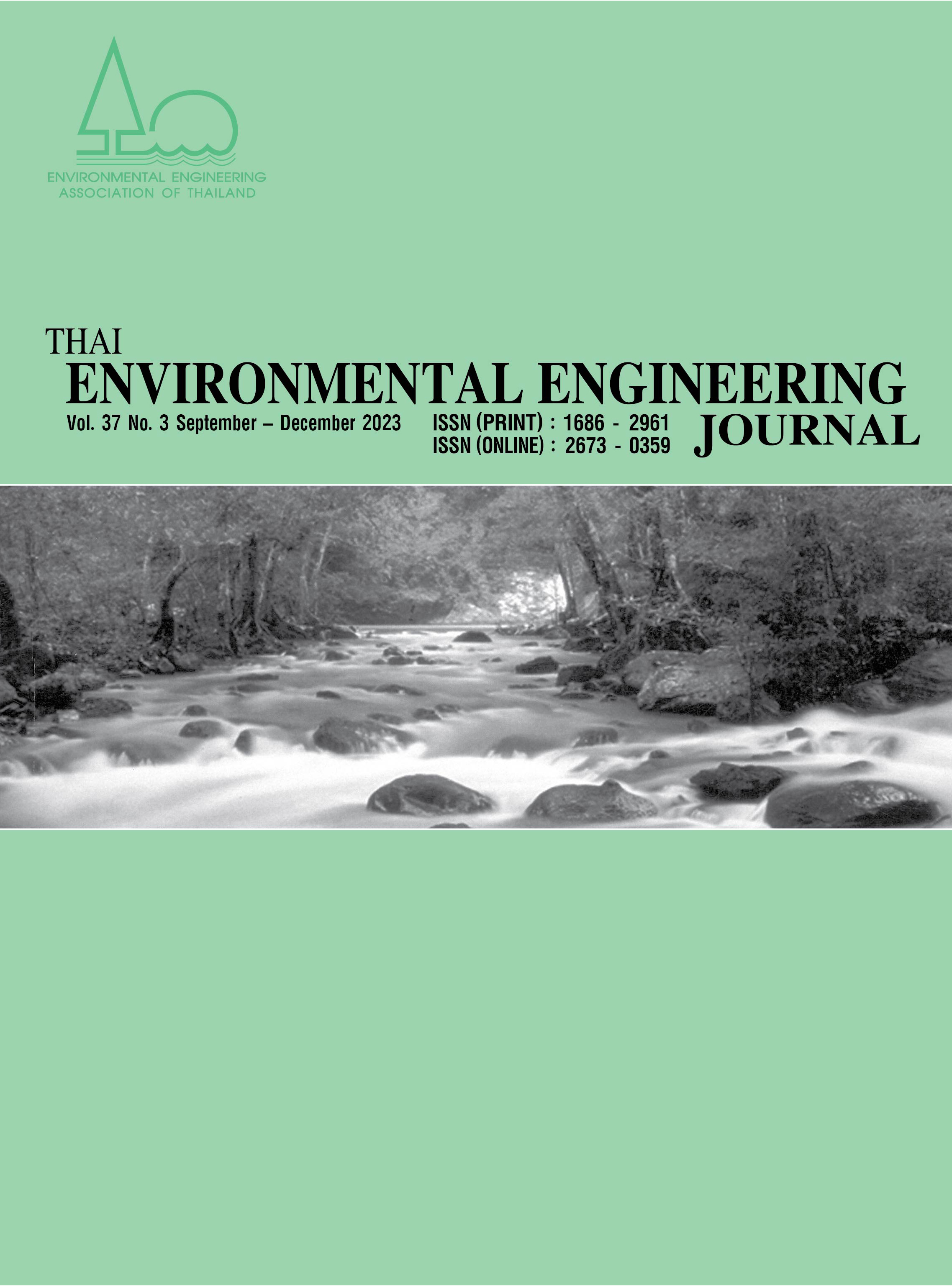Creating Alternative Model to Developed Municipal Solid Waste Management Pratices for Local Government Organization with Analytical Hierarchy Process
Main Article Content
Abstract
This study aimed to find factors used in the selection of appropriate waste management systems and guidelines of Lam Ta Sao municipality, Lamtasao town municipality, Ayutthaya province, Thailand to create a choice of project formats that guide the future of municipal solid waste development. The Analytical Hierarchy Process (AHP) is used to analyze important factors and the results of prioritization are used to determine guidelines for creating final municipal solid waste management system options. The study found that personnel and cognitive factors have the highest priority (14.95%), followed by cooperation and process factors (14.34%), area conditions factors (12.90%), strategic waste management support factors (11.03%), economic factors (10.36%), social conditions factors (9.56%), waste management systems factors (8.53%), personnel potential factors (8.38%), budget factors (5.14%) and material factor (4.81%) respectively. The results of prioritizing factors can be used to create alternative models to develop waste management guidelines, which can be divided into 5 characteristics: (1) Options for determining personnel development guidelines. (2) Choice of various methods and processes for waste disposal to support the disposal of each type of waste. (3) Appropriate waste management options through participatory processes. (4) Options for setting waste management guidelines in multiple situations with a spatially integrated method and (5) Choice of concepts and working principles that are consistent with the waste management strategy. The factors obtained from this study can be used as the main guideline for selecting a waste management model in the study area. Other related spatial data can also be added as supplementary data for determining the other necessary details. However, this study still requires the use of many working mechanisms, especially those of the government sector. Moreover, this study also requires the use of up-to-date studies of all dimensions of data to be able to develop better efficiency.
Article Details
References
Jebaranjitham, J. N., Christyraj, J. D. S., Prasannan, A., Rajagopalan, K., Chelladurai, K. S. and Gnanaraja, J. K. J. S. 2022. Current scenario of solid waste management techniques and challenges in Covid-19-A review. Heliyon.
Guerrero, L. A., Maas, G. and Hogland, W. 2013. Solid waste management challenges for cities in developing countries. Waste Management, 33(1): 220-232.
Sharma, K. D. and Jain, S. 2020. Municipal solid waste generation, composition, and management: the global scenario. Social Responsibility Journal, 16(6): 917-948.
Manomaivibool, P. Wasteful tourism in developing economy? A present situation andsustainable scenarios. Resources, Conservation and Recycling. 2015; 103: 69-76.
Luanratana, W. and Visvanathan, C. 2017. Sustainable Waste Management: A Case Study of the Bangkok Metropolitan Authority. In Sustainable Development Policy and Administration (pp. 353-371). Routledge.
Areeprasert, C., Asingsamanunt, J., Srisawat, S., Kaharn, J., Inseemeesak, B., Phasee, P., ... and Chiemchaisri, C. 2017. Municipal plastic waste composition study at transfer station of Bangkok and possibility of its energy recovery by pyrolysis. Energy Procedia, 107, 222-226.
Sukholthaman, P. and Shirahada, K. 2015. Technological challenges for effective development towards sustainable waste man.
Hornsby, C., Ripa, M., Vassillo, C. and Ulgiati, S. 2017. A roadmap towards integrated assessment and participatory strategies in support of decision-making processes. The case of urban waste management. Journal of Cleaner Production,
, 157-172.
Keser, S., Duzgun, S. and Aksoy, A. Application of spatial and non-spatial data analysis in determination of the factors that impact municipal solid waste generation rates in Turkey. Waste Manag. 2012; 32(3): 359-71.
Camarillo, M. E. and Bellotindos, L. M. 2021. A Study of Policy Implementation and Community Participation in the Municipal Solid Waste Management in the Philippines. Applied Environmental Research, 43(2): 30-45.
Aceleanu, M. I., Şerban, A. C., Suciu, M. C. and Bioiu, T. I. 2019. The management of municipal waste through circular economy in the context of smart cities development. IEEE Access, 7, 133602-133614.
Kongroy, P., Kaewkamthong, P., Pinawet, T., Tungsuwan, I. and Noikondee, R. 2021. Knowledge, needs and satisfaction with the waste recycling bank project Phetchabun Rajabhat University. Journal of Science and Technology Phetchabun Rajabhat University, 1(1): 75-85.
Wongthongdeepeekaew, P., Tabucanon, A. S. and Sereenonchai, S. 2023. Strategic Environmental Assessment: A Case Study of Mueang Lopburi District, Lopburi Province, Thailand. Thai Environmental Engineering Journal, 37(1): 73-88.
Salguero-Puerta, L., Leyva-Díaz, J. C., Cortés-García, F. J. and Molina-Moreno, V. 2019. Sustainability indicators concerning waste management for implementation of the circular economy model on the University of Lome (Togo) Campus. International journal of environmental research and public health, 16(12): 2234.
Fagnani, E. and Guimarães, J. R. 2017. Waste management plan for higher education institutions in developing countries: The Continuous Improvement Cycle model. Journal of cleaner production, 147, 108-118.


